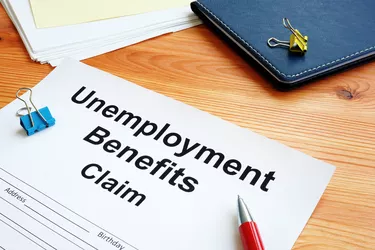
When you become unemployed through no fault of your own, you have the right to file for unemployment benefits. Your state's unemployment agency will conduct an unemployment investigation by contacting your former employer to find out if you are entitled to those benefits. If you claim that you qualify for unemployment benefits and your former employer claims that you do not, the state may decide against awarding you those benefits.
Federal Unemployment Tax Act
Video of the Day
Under the Federal Unemployment Tax Act, employers must pay an unemployment tax on all of their wage and salaried employees. Your employer has a responsibility to pay federal and state unemployment taxes to ensure that former employees have some type of income if they should become unemployed.
Video of the Day
Employers may pay 6 percent on each of their employee's wages up to $7,000 each year per employee under the federal standards. Most states have adopted a wage limit higher than $7,000. If employers pay state taxes on time, they receive a 5.4 percent tax credit dropping their federal tax rates on each qualifying employee to 0.6 percent of each employee's wages.
Employer Unemployment Taxes
An employer must pay the federal unemployment tax when he has employed at least one employee for at least 20 calendar weeks per year or if he paid $1,500 or more to an employee during a quarter of a calendar year. Employers must also pay state taxes.
The state deposits these taxes into its account in the Unemployment Trust Fund in the federal treasury. The state withdraws these funds when state residents claim and qualify for unemployment benefits.
Unemployment Investigation Process
When you file a claim for payment of unemployment benefits, your state conducts an investigation to determine your eligibility for these benefits. The state contacts your previous employer and requests information on your separation from employment.
To award unemployment benefits, the state needs to determine that you became unemployed through no fault of your own. If your employer reports anything to the contrary, the state may deny you the benefits.
However, recent passage of the CARES, or Coronavirus Aid, Relief, and Economic Security, Act has seen some unemployment restrictions relaxed a bit. For example, under the CARES Act, states can now offer unemployment benefits to self-employed individuals and independent contractors. Workers can also qualify for unemployment insurance if they're affected by COVID-19 because they must quarantine, take care of a sick relative or are in a high-risk group.
Unemployment Appeals Process
If you are denied benefits, you can appeal that decision. A hearing officer, acting on behalf of the state presides over your case. You have the opportunity to present evidence and witnesses to bolster your case. Your employer can also appear at the hearing to present his side of the case.
Consider this example: Your employer reported to the state that you quit your job for no reason, and this report caused you to lose unemployment benefits. You appeal the state's decision.
You present evidence that you were repeatedly harassed during your time of employment, and that you made your employer aware of that fact. The harassment never stopped, therefore you quit your job. The state could decide that you left your job for good cause.